IVF

When to Start IVF Treatment?
Many couples prefer to try conceiving naturally for a long time before seeking specialized help. However, such delays can negatively affect the success of IVF, as the quantity and quality of a woman’s eggs decrease with age. The fewer eggs retrieved, the fewer embryos can be created — and the fewer options there are for transfer. That’s why it’s important to consult a specialist as early as possible if you’re having difficulty conceiving.
First Steps: Necessary Tests
Before beginning IVF treatment, several important medical tests must be completed. These tests are usually done on the second, third, or fourth day of the menstrual cycle on an empty stomach. They include:
- Hormonal tests for FSH, LH, and E2 – to determine the levels of female reproductive hormones.
- AMH test (Anti-Müllerian Hormone) – to assess the ovarian reserve
An ultrasound exam is also essential on the second or third day of the cycle to evaluate the condition of the ovaries and count the number of follicles.
The Role of a Healthy Lifestyle
During IVF, not only medical treatment matters but also maintaining a healthy lifestyle, which helps prepare the body and improve the chances of success.
- Nutrition: The diet should be balanced and rich in greens and protein.
- Physical activity: Regular exercise or walking outdoors improves both physical and mental well-being.
- Avoiding bad habits: Tobacco use should be minimized or completely avoided.
- Emotional readiness: It's important to avoid stress and maintain emotional balance.
IVF Is Not a Miracle Pill
It’s important to understand that IVF is not a magical solution. The success of the procedure depends on many factors such as overall health, lifestyle, and following your doctor’s recommendations. Proper preparation and a conscious approach significantly increase the chances of a successful outcome.
Starting IVF treatment on time and under the right conditions has helped many couples fulfill their dream of having a child. Patience, awareness, and readiness for the process are key components of success.
To learn more about the IVF process, its stages, and key preparation steps, we recommend watching an interview with Dr. Op. Dr. İrina Ergül on NTV. In this interview, the doctor shares valuable advice, explains the details of the treatment, and answers the most common questions. Don’t miss the opportunity to learn from an expert!
About the main thing in IVF
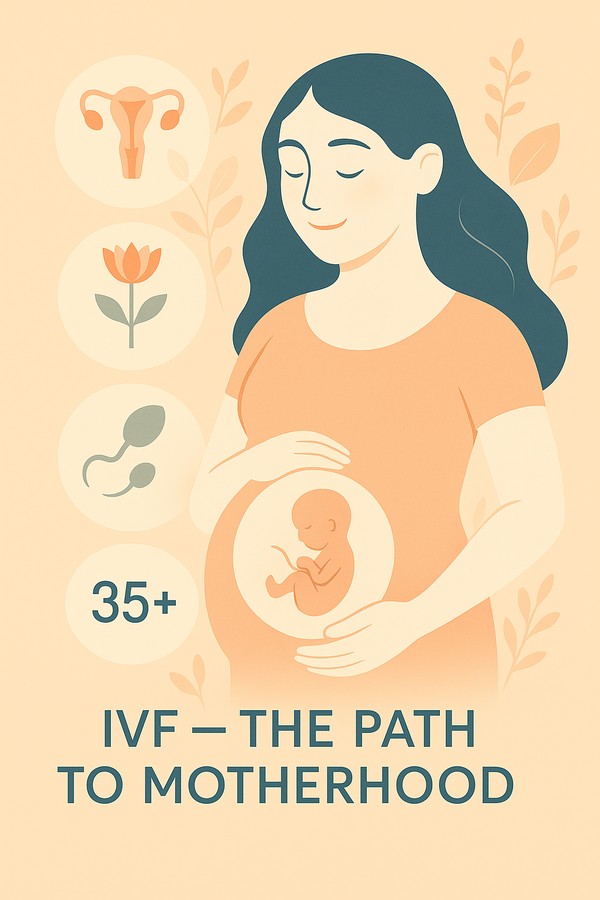
In Vitro Fertilization (IVF) is a modern method of treating infertility that helps couples who are unable to conceive naturally. The procedure involves fertilizing a woman’s egg with sperm in a laboratory setting, after which the resulting embryo is transferred into the uterus.
This procedure has revolutionized infertility treatments, giving hope to those who struggle with conception and offering a reliable option for starting or expanding families. IVF also provides a solution for those with unexplained infertility, where no specific cause is found. The success rate has improved significantly over time due to advancements in medical technology, offering a higher chance of success with each attempt.
IVF is recommended when natural conception is not possible or is significantly difficult. The main indications include:
- Absence of ovulation or blocked fallopian tubes in the woman
- Poor sperm quality or insufficient sperm count in the man
- Woman’s age over 35, when egg reserve and quality decline
- Genetic disorders requiring preimplantation selection of healthy embryos
- Unsuccessful attempts to conceive using other infertility treatments
IVF stages
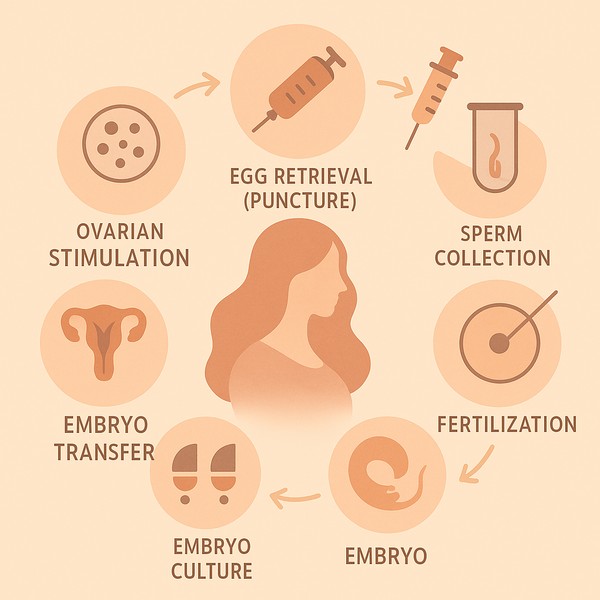
The process of in vitro fertilization (IVF) involves several stages:
- Preparation: Undergoing medical examinations, lab tests, and preparing the body for the procedure.
- Ovarian stimulation: The woman takes hormone medications to stimulate the maturation of multiple eggs.
- Follicle puncture (egg retrieval): The eggs are collected using a fine needle under ultrasound guidance.
- Fertilization: In the lab, the eggs are combined with sperm (or intracytoplasmic sperm injection – ICSI – is performed).
- Embryo cultivation:: Over 3 to 5 days, specialists monitor the development of the embryos.
- Embryo transfer: The best-quality embryo is transferred into the uterus.
- Waiting for results: After 12–14 days, a blood test for hCG is performed to determine if pregnancy has occurred.
What does success depend on
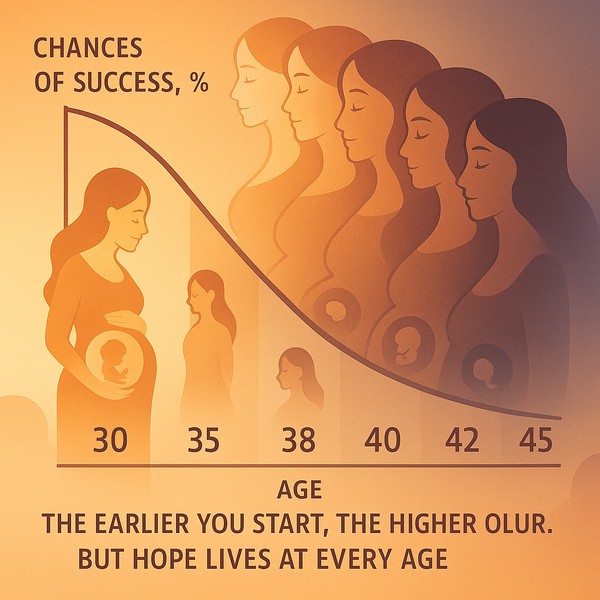
The success of IVF depends on the woman’s age, overall health, embryo quality, and other factors. On average, the chances of pregnancy are as follows:
- Under 35 years old – 40–60%
- Ages 35–40 – 20–40%
- Over 40 – 5–20%
Factors influencing IVF success:
- Woman’s age (the younger, the higher the chances of success)
- Quality of the eggs and sperm
- Overall health and lifestyle
- Experience of the doctors and quality of clinic equipment
Some risks
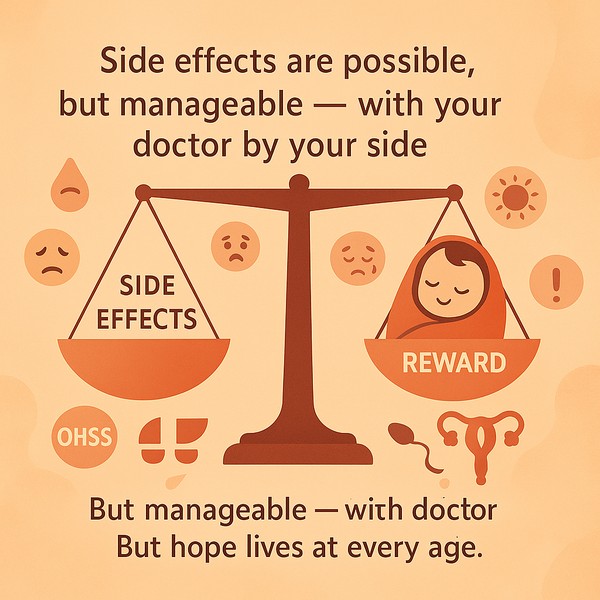
As with any medical procedure, IVF may be associated with certain risks, although the procedure is generally safe. However, it's important to be aware of the possible complications:
- Side effects of hormone therapy – headache, abdominal bloating, mood swings, fatigue, and discomfort can occur as a result of the medications used to stimulate the ovaries.
- Ovarian hyperstimulation syndrome (OHSS) – a rare but possible complication where the ovaries overreact to stimulation, leading to swelling and pain in the ovaries.
- Failure after the first attempt – sometimes multiple cycles are needed to achieve a successful pregnancy. It’s important to stay positive and work closely with the medical team to improve chances in subsequent attempts.
- Multiple pregnancy – if more than one embryo is transferred, there is a higher risk of carrying twins or more, which can increase the risks for both mother and babies, including premature birth.
- Risk of miscarriage or ectopic pregnancy – similar to natural conception, IVF pregnancies can result in miscarriage or ectopic pregnancy, which may require medical attention.
Before you start
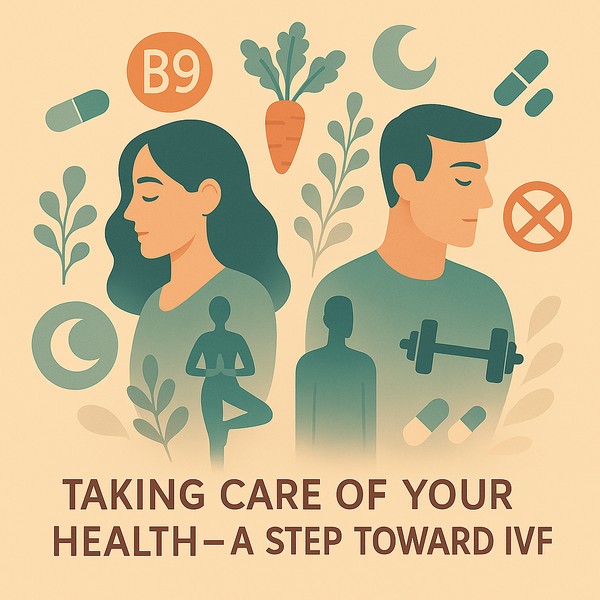
Before starting the procedure, it is important to prepare the body and reduce potential risks. The following is recommended:
- Undergo a full medical examination
- Consult with a fertility specialist to review your medical history and assess your reproductive health
- Follow a healthy diet (with sufficient vitamins, omega-3, and folic acid)
- Maintain a healthy weight and avoid stress
- Engage in regular, moderate physical activity
- Normalize your sleep pattern (at least 7-8 hours of quality rest)
- Limit caffeine and sugar
- Consult your doctor about taking supportive medications or vitamins
- Stay hydrated and avoid smoking or alcohol consumption
A failed IVF attempt is not the end of the road
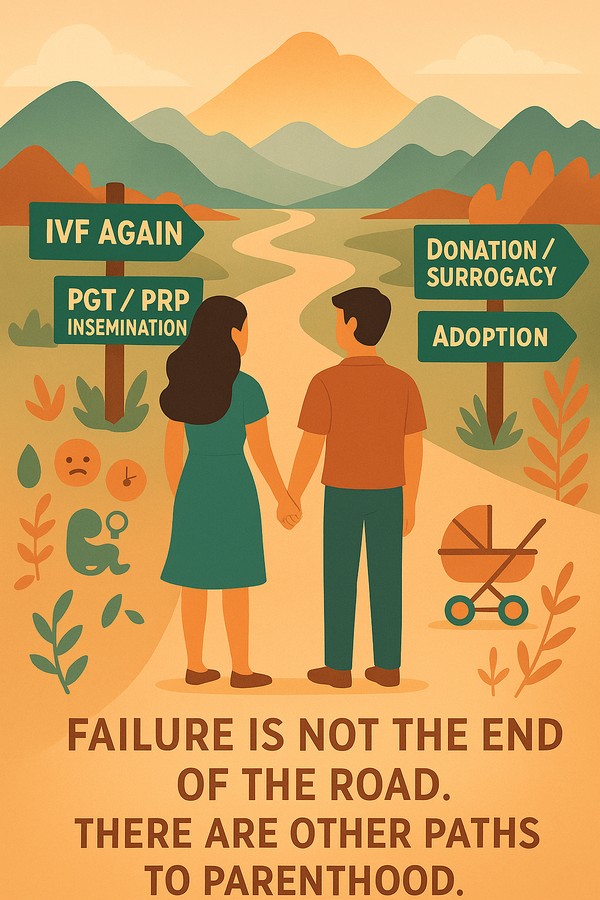
A failed IVF attempt is not the end of the road. Many couples achieve success after the second or third cycle. If the first attempt is unsuccessful, it may be worth considering the following options to improve future outcomes and maintain emotional well-being:
- A repeated IVF cycle. Often, a woman's body responds better to repeated stimulation, and doctors can adjust the treatment protocol to increase effectiveness.
- Using frozen embryos (if available). This reduces the physical and hormonal load on the body and may improve the chances of successful implantation and pregnancy.
- Genetic testing of embryos (if chromosomal abnormalities are suspected). This can help select the healthiest embryos and avoid implantation failures or genetic disorders.
- Using donor eggs or sperm (if one’s own are not suitable). Donor materials can significantly increase the chances of a successful pregnancy, especially in cases of low egg or sperm quality.
- Exploring alternative options, such as adoption. If IVF does not bring results or there are medical contraindications, some couples consider adopting a child, which can also be a deeply fulfilling and loving path to parenthood.
The IVF process can be emotionally challenging. Waiting for results, possible failures, and pressure from others can cause anxiety and stress.
Important:

- Communicate openly with your partner and support each other
- Don’t blame yourself if the first attempt was unsuccessfulось.
- Seek help from a psychologist if you feel emotionally overwhelmed
- Find support among others who are going through a similar experience
In vitro fertilization is a chance for many couples to achieve the long-awaited joy of parenthood. The most important thing is to stay informed, trust your doctor, and never lose hope!
Contact us
- Dear Ladies!
Dr. Irina Ergul is now seeing patients at her private practice. Consultations are available by appointment only. - You can make an appointment by calling: Doctor's Secretary: +90 212 442 66 30 and +90 506 886 18 86
- You can book an appointment via Telegram
- Web-site: rusginekolog.com, with detailed information.
- Bahçelievler mah., E-5 Yanyol No 14/B Metroport Busidence /Bahçelievler/İstanbul. Office No 1009, floor 10.
- The doctor kindly asks for your understanding regarding possible delays in appointment times due to urgent situations that frequently arise in obstetrics and gynecology.


